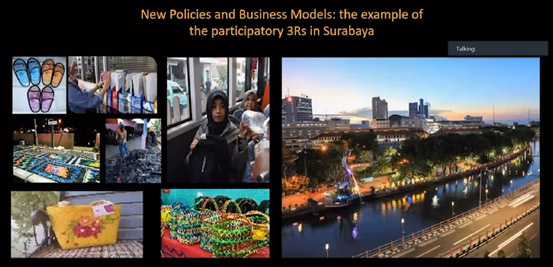22-23 July 2020 | Jakarta – UCLG ASPAC, under the framework of Climate Resilient and Inclusive Cities (CRIC) Programme funded by the EU, called cities to fight climate change by planning differently through a 2-day online training on Sustainable Urban Design and Development attended by close to 200 city officials from the Asia and Pacific Region.
Cities are called to plan differently, by understanding their risks, promoting participatory processes, turning to nature-based solutions and mainstreaming climate change mitigation and adapation policies across development sectors.
John Echlin from Echlin Planning Advisory reiterated the importance of cities to understand climate hazard and vulnerabilities they face when starting planning processes. In Indonesian context, as an example, there are cities at risk due to rising sea-level while others are at risk of forest fires. “Cities need to look at these climate risks, deal with them, use the plan cycle to assess these risks and the results in the planning, then feed them back to real world. This is a circular process that needs to be followed up over time,” he said to the audience.
Planning for and with the People
Planning differently also means planning for and with the people, as expressed by all the speakers. Planning should address social vulnerability by making sure that urban development helps close the inequality gaps. It has been well studied that the growth of urban populations is accompanied by the growth of informal settlements. Eric Huybrechts from the ISOCARP said that city planners must answer the challenge on how to include these informal settlements in the city planning.
The answer to this challenge is not easy as all speakers agreed. However Mahak Agrawal from Spatial Perspectives underlined that governments need to change their mindsets when defining informality. “We tend to see informal as illegal. The reality is, these people who are called illegal do not have access to tenure security. With a different mindset, we can come up with a different approach, for example, by providing housing for urban poor,” she said.
Involving local communities, especially the most vulnerable groups, in planning and policy-making processes is essential. Derek Martin, in the governance session, highlighted the importance of transparency, accountability and participation. “Governing a city is not an isolation, it is interdependence, with all actors and stakeholders. City administrators need to see themselves as part of a network, both public and private, and adapt to this change. They need to be flexible, accommodate various stakeholders and seek to find a win-win solution,” he said.
The power of civic engagement can be seen in Surabaya City of East Java. Nicholas You from the Guangzhou Institute for Urban Innovation shared a best practice from Surabaya with its waste reduction campaign. Despite having small budget to deal with the waste problem, the campaign grew by involving local people, small and medium enterprises, large enterpises and the academe. The method used is a combination of many things, from using black soldier flies as a waste recycler to paying bus fare with plastic waste. “The mayor of Surabaya succedded in changing people’s behaviour, production and consumption pattern. Through the participation of many people, Surabaya has reduced its waste and more importantly, everyone is involved,” he explained.
From the training, participants also learned about best practices. One of the example was shared by Federico Aili from the ISOCARP showing how coastal cities can mitigate coastal flooding by adopting nature-based solutions. In the northern part of Java, local communities use semi-permeable barrier made of tree branches, sand and nets to trap mud and sediment, as a coastal defence while allowing mangroves to grow.
Wrapping up the training, the Secretary General of UCLG ASPAC highlighted the importance of project execution by putting the plan into action. She also expressed hope that the online training can be very useful for all participants, and that UCLG ASPAC is expecting feedback and input from the participants.
The training is the the first of five trainings to be delivered through CRIC, the European Union-funded, 5-year-programme, led by the UCLG ASPAC, in partnership with Pilot4DEV, ACR+, ECOLISE, Gustave Eiffel University and AIILSG.











